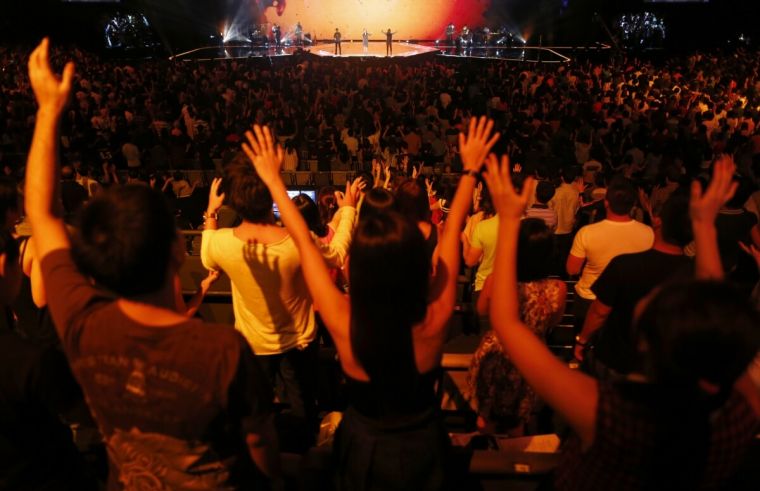What is it about megachurches that stops people from getting involved?
The larger the church, the less likely its members will attend weekly services, a new Duke University study has found.

It might seem counter-intuitive, but David Eagle, a postdoctoral researcher at Duke University, concluded from his study that megachurches are a reflection of the "increasing detachment from religious organisations" prevlent in our society.
The study, which is featured in Socius – a journal of the American Sociological Association – found a reverse correlation between church size and attendance.
The study found that there is a "negative relationship between size and probability of attendance for Conservative, Mainline, and black Protestants and for Catholics in parishes larger than 500 attenders."
In an interview with the Christian Post, Eagle – who is also a pastor –said he "wasn't all that surprised" by the report's findings.
And to be honest, neither was I.
Eagle noted that German sociologist Georg Simmel "argued that big groups create a less involved membership," which seems to be playing out in megachurches.
But just how is it that megachurches – as defined in the study as a church with a congregation of over 2,000 – maintain such a high number of members, yet such a low level of commitment?
1. Anonymity
These churches are really, really big. Unless you are a part of the leadership team or a staff member, your attendance at church on a Sunday is likely to go relatively unnoticed.
Eagle said, "By nature they are more anonymous places – your comings and goings aren't noticed from week to week and you may not face the same encouragement – or pressure – to attend as in a smaller church."
The truth is that it's difficult to be known in a church or any gathering of that size. This might mean that an individual's focus in coming to church becomes more about the teaching than community. Teaching is undoubtedly important, but with the advent of podcasts and live streaming, it's becoming less necessary to actually turn up on a Sunday if that's all you're after.
Megachurch members may well seek community elsewhere, either through small groups or other organisations, but it is unlikely to be found on a Sunday in a theatre with thousands of other faces.
2. Consumer culture
Megachurches, typically located in large auditoriums or theatres on the outskirts of town, play into the palm of our consumerist culture's hand. Their intention is unlikely this, but the very geography of the service, in which a large audience on tiered seating looks over at a miked pastor on a backlit stage, lends itself to a passive mode for the congregant.
I don't mean to suggest that worshippers in the congregation do not engage with God during these services – there is great power in corporate worship – nor do I mean to say that people do not learn well from these sermons delivered from a stage. It is just that this setting predisposes the congregation to enter the church as a consumer, ready to receive from the Lord, but not necessarily ready to serve.
3. The professionalisation of Church
Megachurches do things excellently. They have excellent pastors, preachers and musicians, which can be an incredible gift.
However, this excellence can also create a barrier. When a church is run by professionals, it can lead to those who are not members of staff feeling like they are just extras in a show.
This feeds into the "consumerist culture" point. When Church becomes a product that professionals perform, congregants are left to consume that product, rather than contribute to it. Of course, there are few places where this is absolutely true, but it's a problem to some degree right across the Church body. When some people do a lot, the rest are disempowered to do much.
If there is a staff team that runs the welcome, the service, the worship and whatever else a church offers on a Sunday, then there becomes less of a role for other members to serve in than there might be in a smaller church. It also might just feel a little bit more intimidating when the things a church does are carried out with such excellence.
---
The challenge of the megachurch is that it is built on a model of 'big is best', trying to attract as many people as possible in order that they might be saved. This is a good vision, but discipleship becomes more of a challenge when the numbers grow. It is easier for people to drift, remain anonymous and disengage from the community. It can encourage a consumer culture where people arrive, receive teaching and worship, and then leave, without really connecting with anyone else.
There is an alternative, but it requires a resetting of how we think about church. Rather than seeing it as something to be consumed, we must look at it as a worshipping community that we get to be a part of. The focus then becomes on community; on being a "called out people", and on relationship.
Maybe instead of church being a Sunday service for thousands of people, it needs to be midweek gatherings of tens of people. Maybe instead of church being a service where we listen to teaching, it needs to be a gathering where we discuss and pray about the message we heard. Maybe instead of church being something we consume, it needs to become something we commit to and serve.
Sunday services where thousands gather to hear the word of God and to worship him are a good thing, there's no denying it. It's just that people need community, they want to get stuck in, and when there are 2,000 people in the room it's hard to know where to start.











